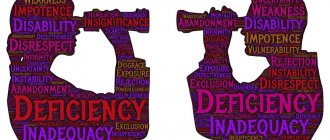Self-esteem is a psychological phenomenon that refers to a person's overall sense of his or her worth and importance. It can be considered a kind of measure of how much a person values, approves, respects and loves himself. Self-esteem is an individual’s subjective idea of the importance and place of his personality in society, the usefulness of his activities for society. This is an assessment of one’s own qualities and abilities, existing strengths and weaknesses.
Adequate self-assessment involves a critical look at one’s thoughts and actions, regular comparison of available capabilities to the actual requirements. A correct perception of one’s own “I” presupposes the ability to independently choose a strategy of action, set achievable goals, objectively evaluate the results achieved, carefully check the guesses that have arisen, impartially analyze all the arguments for and against, and without hesitation abandon unpromising plans.
Adequate self-esteem supports self-esteem and brings moral satisfaction with one’s life. A constructive or non-constructive attitude towards oneself leads either to harmony in the inner world, or to an eternal conflict with oneself, sometimes leading to neurosis.
What affects self-esteem
The way a person perceives his own personality is influenced by both innate (unchangeable) and acquired factors. Among the components that serve as the foundation for the formation of an individual’s self-esteem are the following circumstances:
- genetic component (favorable or unfavorable heredity);
- an innate personality trait – temperament;
- accentuation of character (dominant traits);
- life experience;
- age;
- state of physical and mental health;
- predominant thinking style, typical thoughts;
- optimistic or pessimistic assessment of the past, present, future;
- social circumstances;
- typical reactions of others (praise, criticism);
- results of comparing yourself with other people.
An important note is that self-esteem is not a fixed and static construct. This is a malleable and changeable psychological phenomenon, that is, anyone can correct it.
Factors that influence self-esteem
Psychologists have established and described a number of conditions that have a direct impact on the quality of the subject’s perception of his “I”. The list included factors:
- Commitment to the role of spouse and parent is directly related to self-esteem (Reitzes & Mutran, 1994).
- The employee’s identity with the social unit influences the degree of self-esteem (Reitzes & Mutran, 2006).
- Married status and age over 40 contribute to lower self-esteem (Reitzes & Mutran, 2006).
- Higher education and high income provide higher self-esteem (Reitzes & Mutran, 2006).
- Low socioeconomic status and low self-esteem are directly related (Wagner, Hansen, & Gerstorf, 2018).
- Living alone and not having a significant other leads to low self-esteem (vanSoest, 2018).
- Unemployment and disability contribute to decreased self-esteem (vanSoest, 2018).
- Personal maturity and emotional stability ensure an adequate opinion of oneself (vanSoest, 2018).
- Placing high importance on the opinions of friends and family members about appearance, habits, and character has a negative impact on self-esteem (Chang & Suttikun, 2017).
What distinguishes self-esteem from other human traits and conditions?
Despite the similarity of concepts, psychologists distinguish the phenomenon of self-esteem from other similar traits, qualities and states.
Self-perception and self-esteem
A term similar to self-esteem is self-perception (Self-image). It is similar to self-esteem in the sense that it all depends on how a person sees himself as a person and how he perceives himself (McLeod, 2008). However, rather than being grounded in reality, self-perception may be based on false and inaccurate thoughts about oneself. An individual's self-image may be close to reality or far from it, but in general it does not fully correspond to the objective picture or how others perceive the person.
Self-respect and self-esteem
Self-esteem is a concept similar to self-esteem, but with a slight (though important) difference. Self-esteem is what a person thinks and feels about himself, while self-esteem is the more global recognition that he is a valuable person worthy of attention, respect, and love (Hibbert, 2013).
Self-confidence and self-esteem
Self-esteem is not self-confidence at all. Self-confidence is the trust in oneself and the ability to cope with challenges, solve problems, and successfully interact with the world (Burton, 2015). Self-confidence is based more on external indicators of success and value than on internal indicators that contribute to self-esteem. It is possible to have high self-confidence, especially in a particular area, but still lack a healthy sense of overall self-worth.
Self-efficacy and self-esteem
Like self-confidence, self-efficacy is also related to self-esteem, but has a number of differences. Self-efficacy refers to an individual's belief in one's own ability to achieve success in certain tasks (Neil, 2005). An individual may be high in self-efficacy when it comes to playing volleyball, but have low self-efficacy when it comes to doing well in math. Unlike self-esteem, self-efficacy is more specific than global and is based on external success rather than intrinsic value.
Self-compassion and self-esteem
Finally, self-esteem is not self-compassion either. Self-compassion focuses on how we feel about ourselves rather than how we judge or perceive ourselves (Neff). Being self-compassionate means that a person is kind to himself and forgiving himself, that he avoids being harsh or overly critical of himself. Self-compassion can lead to a healthy sense of self-worth, but it is not self-esteem in and of itself.
Signs of adequate self-esteem
There are certain characteristics that distinguish a person’s adequate self-esteem. Examples of these descriptions are:
- openness to constructive criticism;
- admitting mistakes made;
- ease of giving and receiving compliments;
- demonstrating harmony between what a person says and does.
People with true self-esteem are not afraid to show their curiosity and discuss their experiences, ideas and opportunities. They enjoy the humorous aspects of their lives and feel confident in their social roles.
Individuals with adequate self-esteem value themselves and other people. Enjoy personal development and growth. Find satisfaction and meaning in their lives. Able to recognize their experiences. They are creative individuals. They find their own solutions to problems and have personal opinions.
They accept other people for who they are while pushing them towards a more positive state. They can easily focus on solving problems in their lives. Have friendly and respectful relationships with others. Such persons express their point of view calmly and kindly. They openly share their wants and needs with others.
Based on these characteristics, here are some good examples of what adequate self-esteem looks like.
Imagine a high-achieving student taking a difficult exam and receiving a failing grade. If his self-esteem is correct, he is likely to attribute his failure to factors such as not studying the material hard enough, especially a difficult set of questions. That is, the student does not come to the conclusion that he is stupid and, most likely, will also fail all future tests. Having a healthy sense of self-worth leads to accepting reality, thinking critically about why one failed, and solving problems instead of wallowing in self-pity and giving up.
As a second example, think about a young man on a first date. He really likes the cute woman he's dating, so the guy wants to make a good impression. In the process of communication, he learns that the lady is guided by completely different values and has a completely different taste. Instead of agreeing with her expressed opinions, he offers his own views, he is not afraid to object to her. His adequate self-esteem helps him stay true to his values and allows him to easily communicate with others, even when they do not agree with his opinions. It is more important for him to behave naturally than to focus on making a good impression.
Fighting low self-esteem
In no case should you allow your own disrespect and dislike for yourself. This is dangerous, both mentally and physically. However, what should those people do who were not lucky enough to be born to wise parents who would support them in everything? Or did the circumstances develop in such a way that you had to constantly be alone, because no one wanted to be friends (to love, appreciate, etc.)? you need to take three steps that will help you radically change everything. These are the techniques.
We make a homemade remedy for caring for jewelry: it will then be clean and shiny
Maintaining friendship: Regina Myannik “fuels” rumors about a relationship with Basharov
Coronavirus detected in minks in Poland can be transmitted to people
Signs of high self-esteem
There is also the opposite phenomenon – inadequately high self-esteem. The fact that people have an inflated opinion of themselves is evidenced by the following factors. This kind of person:
- becomes angry and quickly gets irritated if others do not agree with his position;
- convinced that only his opinion has significance;
- is immensely in love with himself and hates those around him;
- everything he does he considers right;
- insensitive to the opinions of others;
- takes risky actions without thinking about the consequences;
- careless, convinced of his complete safety;
- does not weigh the pros and cons before making a decision;
- rarely sad and yearning;
- often feels an increased joyful, cheerful mood that does not correspond to objective circumstances;
- easily makes new contacts, gathering flattering “admirers” around him;
- avoids communicating with people whom he classifies as “lower class”;
- pays a lot of attention to extolling his virtues;
- confident in his exclusivity;
- without hesitation, demands that others satisfy their own needs;
- often compares himself with others and finds himself to be the best.
Bad advice. How to lower your self-esteem?
No? Have you tried it yet? Here are a few draconian measures towards yourself that will almost certainly help in this matter:
1. All the time (the more often, the better) compare yourself with someone great . The more “grand” the object, the better. Don't take into account any differences: not in life history, not in experience, not in anything - none of this matters. Who has it easy now? Since he could do it, you simply have to be “on the level.”
2. Criticize yourself. Whatever you do, criticize everything. The bigger, the better. The more peremptory, the more reliable. To be sure, always add at the end: “In short, I am a neglected case.”
3. Hit yourself where it hurts - find a vulnerable spot and hit . Don’t let this matter take its course, don’t think that those around you will cope with it without you. The way you hit yourself, no one can hit you. Try.
4. Read more books and articles on psychology. Go to more trainings. Reflect more often. Get up earlier - before dawn (better not go to bed at all), and write: no matter what, your task is to exhaust yourself (so that low self-esteem has room to develop without resistance on your part), so the main thing is to do everything that is advised. You'll think about it later. Do more. What you are already doing is not enough, it is not enough and it is all bad. Remember this.
Criticize yourself. Whatever you do, criticize everything Photo: Depositphotos
5. Demand everything from yourself at once: be a super-wife, a super-mom, a super-businesswoman at the same time. Everything you do must be super, perfect, perfect. There is no desire for superlatives - there will be no low self-esteem. Do you need this?
6. No self-compassion (call sympathy pity - it will be easier to deal with this point). “Stupid”, “loser”, “ugly”, “weakling” - do not forget about effective self-stroking, use them on occasion or without.
Afterword . What actually happens, for example, when we engage in self-criticism? By criticizing ourselves, we attack. Not for someone, but for yourself. For what? What is the logic if it hurts us and gives us nothing but pain?
Self-criticism seems to “save” us from real criticism, so it’s difficult to get rid of it Photo: Depositphotos
Not certainly in that way. Self-criticism causes pain, but it also performs some other important function (on an unconscious level). For example, it works proactively. Perhaps we are afraid that we will be criticized so much that all we can do is hang ourselves. First of all, this fear is strong. Secondly, it is irrational and unconscious - that is, we do not think about it. But it is huge and we are defending ourselves.
Unconscious defenses are triggered instantly and automatically, resulting in self-criticism. That is, by criticizing ourselves, we seem to take control of the attack process. This is safer than dealing with uncontrolled criticism from others. At the cost of one evil, self-criticism seems to save us from another evil.
Therefore, although it is obvious that harmful advice is what not to do, stopping harming yourself is not as easy as it might seem.
Tags: self-esteem, self-criticism
Surprising Facts About Self-Esteem
To understand how important adequate self-esteem is, psychologists recommend studying the facts obtained as a result of large-scale sociological research. Below is a list of some of the most important and significant findings.
Teenage boys with high self-esteem are almost 2.5 times more likely to start having sex earlier than boys with low self-esteem. At the same time, girls with high self-esteem are 3 times more likely to delay the start of sexual activity than girls with a bad opinion of themselves.
Low self-esteem is closely associated with violence, teenage pregnancy, suicide, and low academic achievement.
About 45% of girls and 15% of boys in high school believe that their weight is not up to standard and try to lose weight, driving themselves to anorexia.
Seven out of ten girls believe that they are not good enough and do not meet the ideals of beauty, which leads them to prolonged depression.
The absence of a father in the family, poverty and an unfavorable home environment negatively affect self-esteem.
Excessive guardianship of the child, the parents fulfilling all his desires becomes the basis for an inflated opinion of themselves.
People with inadequately high self-esteem cannot create normal relationships with the opposite sex. They are prone to bullying their other half. They are more likely than others to divorce their spouse at the initiative of their partner.
These facts about inadequate self-esteem are alarming and depressing, but fortunately they do not represent the whole picture. There are many people with a healthy sense of self-esteem, and they reap great benefits. Persons with an adequate perception of their own “I”:
- Less critical of themselves and others.
- Can cope with stress effortlessly and avoid the harmful side effects of stressful situations.
- They are less likely to develop eating disorders.
- Less likely to feel worthless, guilty, or useless.
- More likely to be assertive in expressing and getting what they want.
- Capable of building strong, honest relationships.
- They can make the right decisions.
- Able to bounce back quickly when faced with disappointment, failure and obstacles.
Real story
Lyudmila never felt loved. It was all because of her not very attractive appearance (the girl had been overweight since childhood). Or rather, there weren’t that many extra pounds, but it was enough for Lyuda to feel like the ugliest girl on earth. In high school, if anyone paid attention to her, she felt like the boys were just making fun of her. Nothing changed after finishing school and then university. At 25 years old, Lyudmila had neither friends nor girlfriends. She sat at home in the evenings, felt sad and dreamed of a magical transformation, when she could become someone’s beloved and start a family.
The guys still paid attention to her, but Mila did not trust them. It always seemed to her that she could not be loved. When it became unbearable to do nothing, the girl made an appointment with a psychotherapist. And then what she dreamed about happened. Her worldview truly changed miraculously. She realized that she was worthy of love, and life seemed wonderful to her. Moreover, she was proposed to, and now she needs to prepare for the wedding.
At the end of February, “Khaki Resort” airs on Channel One: what is known about the series
Mom became a bodybuilding champion, losing 63 kg, and the comparison photos are amazing
An outbreak of a previously unknown disease was recorded in Tanzania
How to get rid of high self-esteem
Self-esteem researchers have provided practical advice on how to build good self-esteem and develop a healthy sense of self-worth. These include the following recommendations:
- Write down 10 strengths and 10 weaknesses. This will help you begin to develop an honest and realistic view of yourself.
- Set realistic expectations. It is important to set small, achievable goals that are within your control. For example, having extremely high expectations will virtually guarantee that a person will become a failure.
- Stop being a perfectionist. Recognize your achievements and mistakes. Confidence in your perfection will only lead to disappointment over time. Admitting your mistakes is a way to maintain a positive outlook on life while learning from your mistakes.
- Explore your own personality. The importance of getting to know yourself and the world cannot be overstated. It may take effort, but it is a journey that should be undertaken with special diligence.
- Be prepared to adjust your image. All people change as they grow and develop. Therefore, you need to keep up with the times in order to achieve significant goals.
- Stop comparing yourself to others. Comparing yourself to others is a trap that is very easy to fall into, especially today, thanks to social media, which creates the opportunity to project a polished, perfect, but unnatural appearance. The only person you should compare yourself to is your own personality.
- Act confidently, without feeling any guilt, but without putting yourself above the interlocutor.
- Focus on the present moment rather than praising the past.
- Reject the desire to manipulate others.
- Acknowledge and accept a wide range of feelings, both positive and negative.
- Enjoy a healthy balance of work and play.
- When taking on challenges, take calculated risks.
- Communicate tactfully with other people, not being afraid to express your likes and dislikes, but without humiliating the dignity of your opponent.
- Appreciate others and accept them for who they are without trying to change their character.
Another list of specific, practical steps you can take to develop and maintain adequate self-esteem:
Use distance pronouns. When you feel the urge to praise yourself, try expressing flattering phrases in a more distant manner. For example, instead of saying: “I’m absolutely right,” say: “Sergei is right again.” This will help you see the situation in real light.
Remind yourself of your mistakes. The best way to come back down to earth is to admit that you have made mistakes in the past from which you have learned.
Move more! Both a leisurely walk and an intense two-hour session in the gym are suitable. It doesn't matter what exactly you do. The important thing is that you are more in touch with your body and improve your physical and mental health.
Use the five second rule. This rule is to follow good thoughts and follow up ideas with action. Do something to make a great idea to help others last in your thoughts for five seconds and lead to its implementation.
Be well prepared for any situation you may encounter. Provide for all possible ways of development of events.
Limit your use of social media. Spend less time watching TV and more time exploring the world around you.
Meditate. Establish a regular meditation practice to explore and observe your thoughts. Developing a sense of inner peace will go a long way in building healthy self-esteem.
Keep your goals secret. You don't have to keep all your hopes and dreams to yourself, but make sure you keep some of your goals and aspirations for success just for you.
Causes of the phenomenon
They come from childhood. Basically, it is in childhood that an attitude towards oneself as an individual is formed. If positive factors contribute to this (proper upbringing and environment, genetics, positive habits and examples), then the person develops a sense of self-worth. If any of the above is missing, self-esteem falls catastrophically, and with age the problems become more and more numerous. Work also plays a huge role.
If a child always tried to be better, but no one praised him, so he didn’t succeed much, and there is a huge risk that everything will happen again in the adult team. In addition, personal life also suffers, since a person prefers to “eat up” some negative aspects (for example, frustration over the lack of friends). Extra pounds appear, which again do not allow you to feel confident - a vicious circle.
The Russian Ministry of Health spoke about the great interest in the Sputnik V vaccine
What does the coming year of the Ox have in store for Horses and other signs of the eastern horoscope?
With masks: January was the best month for the fitness industry since the start of coronavirus
How to solve self-esteem problems with psychotherapy and counseling
Today, there are many ways that psychotherapy and counseling can help clients develop healthy self-esteem. When a client shares their thoughts and feelings with a therapist and the therapist responds with acceptance and compassion rather than judgment or correction, it lays the foundation for healthy self-esteem for the client. Unconditional positive regard allows a person to rethink some of their assumptions and come to the conclusion that adjustments to their self-perception need to be made.
The therapist will explain that self-esteem is a personal belief, not a fact, and that such beliefs are based on our experiences. This helps eliminate the need to cultivate a sense of high self-esteem. The specialist can offer the client new experiences on which a new constructive belief about himself is based.
The most important thing is that the psychotherapist accepts the client as he is, evaluates his thoughts and feelings as acceptable, and does not criticize him for them. The psychologist does not need to approve of the patient's every action, but showing acceptance and approval of who the person is at the deepest level has an extremely positive impact on the patient's self-esteem.
These rules are followed by an experienced, qualified psychologist and psychotherapist Irakli Pozharinsky. Contacting this talented and wise specialist will become an incentive for a person to develop a correct perception of his own personality, to dispel










